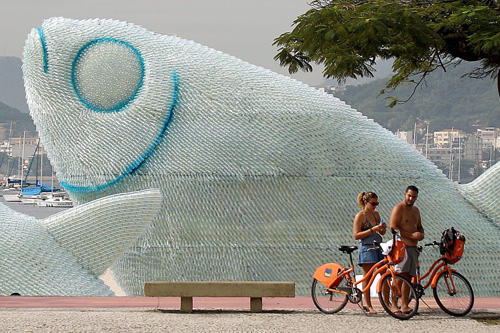|
 |
|
ENVIRONMENTAL ART: Giant fish made of plastic bottles at Botafogo beach in Rio de Janeiro on June 19 (CFP) |
Phil Kline, from Greenpeace U.S.A. in Washington, D.C., told Beijing Review that the concept embodied common human values. He said developed countries should help developing nations because they are in a much more privileged position.
"It will be the right thing to do if they can let poor countries share what they already have," Kline said.
Conflict has dominated the preparatory meetings for Rio+20, as countries from the North and the South disagreed over both fundamental principles and trivial details, frequently in areas such as green economy policies and sustainable development goals. A source close to the Chinese delegation revealed that talks in the two initial rounds of the negotiations between March and May dragged on for weeks, largely because of North-South disputes.
The wording of the document was repeatedly revised, with individual articles added and paragraphs deleted—one step forward, two steps back. The final draft was cut to just 49 pages, down from more than 200 in the beginning. This hard bargaining essentially shows the North and the South were "on the alert against each other," the source said. On June 14, a negotiator identified as representing the Group of 77 member countries reportedly walked out of the meeting room to protest the North's refusal to compromise.
Luiz Alberto Figueiredo, executive secretary of the Brazilian Government's negotiation committee, also acknowledged that "countries with converging interests did form some kinds of alliances during the negotiation process."
Developing countries invariably expressed their disapproval of the North's attitude to shun responsibility. Raoul Ferdinand Diandy, a Senegalese Foreign Ministry official, pointed out rich countries can and should help poor countries in reducing poverty and developing green economy despite their current difficulties.
Hussein Al-Gunied, the Republic of Yemen's Deputy Minister for Environmental Affairs, said, "The North has retreated from what they had promised at the 1992 Earth Summit," which he also attended. He pointed out developed nations should take on a "much greater share of responsibility" in sustainable development.
"They had polluted the water and air, and made heavy use of our energy and other resources, and then, as they became rich and economically powerful, they began to restrict our development. This is not fair," he said.
Green economy dilemma
As one of the major themes of Rio+20, building a green economy was another point of contention between the North and the South. While they all agreed that recognizing the economic value of natural capital and ecological services is important to ensuring sustainable development, serious disputes remained between the two sides at the negotiation table. Again, the reality is developing countries are short of the capital and technology for the industrial restructuring required to implement measures such as carbon emissions trading, while developed nations boast a large pool of such resources.
Germany, for instance, now offers as many as 250,000 job opportunities in local green economy sectors, according to one statistic, and the number is predicted to rise to 300,000 by 2030. "If the North could help the South, in terms of financial aid, technology transfer, as well as market access, not only the two sides, but the whole world will also benefit," said Enoch Deng, Secretary General of the International Green Economy Association, at an NGO event in Rio de Janeiro.
Zhao of CAITEC simply said that by selling the notion of a green economy to the developing world, developed countries actually intended to draw up the rules of the game so that they would make use of the initial opportunities economically or even politically.
| 